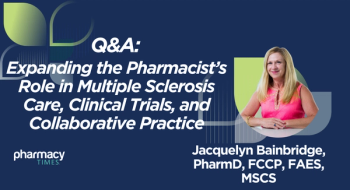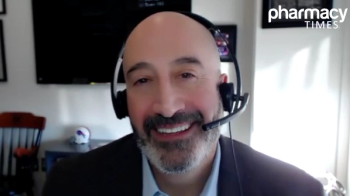
Balancing COVID-19, Opioid Abuse in Rural Communities During COVID-19
Troy Trygstad, PharmD, MBA, PhD, discusses the impact of COVID-19 on rural pharmacies and communities.
Aislinn Antrim: Hi, this is Aislinn Antrim from Pharmacy Times. One of our top stories on the site right now is about how rural pharmacies are adapting their outreach services during the pandemic, including mobile clinics and expanded telehealth services. So today I’m interviewing our Chief Pharmacy Editor Troy Trygstad about COVID-19 and those rural and community pharmacies. So what would you tell these pharmacists who are concerned about handling their own mental health and taking care of themselves—what advice would you give them?
Troy Trygstad, PharmD, MBA, PhD: I think, take some solace in that there’s a lot of folks out there that appreciate pharmacies even more than they have in the past. So I think the popular media has been pretty good about recognizing what pharmacists are going, so obviously if you’re an ED nurse on the front lines or you’re intubating patients, goodness gracious bless you for doing that because you’re extremely high risk with aspiration, etc, etc. If you’re out there on the front lines as a public health worker and you’re in front of folks, you’re testing folks, you’re grabbing those nasal swabs which are very difficult to administer and cause all sorts of coughing and etc, etc—goodness gracious just bless you for doing that. But people are starting to come around to, wait, all of these sick folks and chronically ill are also going to their pharmacy and being served by their pharmacy. So not just the pharmacists, but the pharmacy staff is exposed to this, right, and really any essential business, but particularly the pharmacy. And I think that the media has really appreciated that, perhaps even more so than our care team members, unfortunately, but the media has been pretty good about that. And so I think, you know, be proud of the work that you’re doing out there. But you get to the point where stress and burnout makes a difference. So you hear a lot about pharmacies right now, “Hey, it’s 12 hours that we’re open but we’re working 16-hour days.” Well one of the challenges there is immunocompromised means immunocompromised, so we have to be still vigilant about taking care of ourselves, and I think that that becomes an important part of when you’re tired. You know, reality television has made a business on making people hungry, tired, and susceptible to being cranky with each other, right? That’s the basis of a whole bunch of different reality shows out there. I think that we have to be vigilant about making sure we take care of ourselves when it comes to that. We have to also face the reality over the next 4 weeks to 8 weeks and maybe even beyond, about folks we know that die—patients we know, family members we know, colleagues that we know, teachers at our local high school, middle school, elementary school that we know. And you’re going to be going through the same grief as everybody else, and so I think asking for help and communicating with others is always something that’s really important. Talking to other pharmacists, talking to other people in the community. Again, don’t assume that you’re a superhuman and that you’re immune to that. There’s certainly a lot of social media posts about ED doctors that are clearly struggling, right? And they’re having to make life-and-death decisions. You may be a little bit arms-length from that, but you’re not too far from it as a health care provider on the front lines. And so mind yourself. And then I think, again, reach out for help. I think one of the things that will be easy to predict in the rearview mirror that was not as easy to predict in looking forward in time for us in pharmacy, was that there’s actually a reasonable amount of capacity right now in primary care and behavioral health from a telecom perspective, because their visits are weighed out, right? As people have been told to shelter-in-place they’re also not going in for their routine therapy or going in, so don’t hesitate to reach out to a primary care or behavioral health provider and say, you know, “Hey, I need 15 minutes is there something you can help me with?” And even if it’s informal, that’s fine. So I think asking for help is really important.
Aislinn Antrim: Absolutely. A lot of these rural communities are also at higher risk for opioid issues and similar issues, so how are you seeing pharmacists balance competing issues that always need to be dealt with?
Troy Trygstad, PharmD, MBA, PhD: I think 2 things to keep in mind—and this isn’t the case everywhere, but certainly what we see based on some numbers and from reporting from the pharmacies we work with regularly—is remember that regular capacity is down. Dentists are generally not doing a lot of procedures, there’s not a lot of hip replacements going on out there right now, there’s not a lot of knee replacements going on out there, tonsillectomies, these types of things. And so that has the two-fold effect: 1, there’s just less opioids being prescribed for procedures, and those folks that are usually having those visits, having those procedures, dealing with acute pain from whatever else, and even in the primary care environment, also generally can be more available in some places. It’s not because they’ve restricted hours, and in other places they’re still available or available by phone, so I think you’re still in the same mode of opioid stewardship and caring for patients. I think where things get a little bit more tricky is how do you handle the patient that’s terminally ill? How do you handle that? And I think a lot of that is trying to be as business as usual. So the opioid issues are still out there. Certainly we know that there’s a correlation between unemployment, there’s a correlation between unemployment and domestic violence and substance abuse disorder out there. So we should be vigilant about this, but at the same time, I think the processes that have been put in place to care for paitents still hold. And when you end up in a situation where you just don’t know, you can’t get ahold of somebody, an emergency situation, then treat it like an emergent situation. You’re talking about a short base of supply, definitely.
Aislinn Antrim: My last question for you is what is NCPA doing during the pandemic?
Troy Trygstad, PharmD, MBA, PhD: Well, lots, like all of the associations are. I think it’s trying to create clarity out of ambiguity as much as possible. You know, remember for NCPA it’s not just the practice of pharmacy that they’re advocating for but there’s a whole lot of small businesses out there, so whether it’s the small business loan, the PPA loan, the Paycheck Protection Act, etc, etc, there’s a lot of guidance going on out there just from a small business perspective. And I’m seeing that very much on the medical side, too. I think a lot of these small independent practices are in dire straits, unfortunately. We’re going to have to try and figure out how to keep, you know, them open and some of the PPA stuff will help there. So I think on the policy front, as far as what pharmacies can do around early detection, care management, monitoring of these patients, particularly in the rural areas, but also advocating for services related to delivery and Medicaid covering delivery. This was part of the 1135 waiver that NCPA was looking at, as well. So, you know, we’re probably not through the entirety of policy changes. We’ll probably have a fourth, fifth, sixth act that goes through Congress. I think that we’d be hard-pressed to believe that it’s not going to take the place, certainly pre-vaccine, and we’re probably a long ways out from that. And then also, on the policy side, as the system starts to really get overwhelmed, we’re really tapping into pharmacists and pharmacies, and particularly in rural areas, you know. As one of my mentors, Dr. Dobson, has said frequently and consistently, in rural areas, your health care systems, primary care, the community pharmacy, and EMS, and all that are 30 minutes to 2 or 3 hours away from what most folks in think of as the health care system formally, with emergency departments and multi-specialty clinics. So I think on both of those fronts NCPA’s been very vocal. I think there’s the issue of performance for star ratings and the DIR fees that are all important in a stressed system, and then what are we going to do about testing? Not just testing for the antigens and testing whether you have it, but there’s this really, really important concept of antibody testing that pharmacies could and should play a really important role in. That is not diagnostic so much as “Hey you not have COVID but here’s what we’re going to do,” or “ You’re displaying symptoms of COVID,” but it’s have you had it, where are you at with it, and as we start to try to reopen the economy and get people back into the workforce, what is the process by which we get 300 million Americans back to normal? And testing is going to play a really important role in that. I think NCPA and APHA and a lot of the other national associations are thinking about that, and the state associations have been really critical to the state level. So I think now’s a better time than any other time to be engaging in supporting your local state national associations. It’s really, really important not only for pharmacists but also for patients.
Aislinn Antrim: Absolutely. Well thank you so much for joining us. Now let’s hear from some of our other MJH Life Sciences brands on their latest headlines.
Newsletter
Stay informed on drug updates, treatment guidelines, and pharmacy practice trends—subscribe to Pharmacy Times for weekly clinical insights.


























